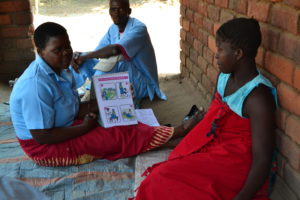1) Reproductive Health Rights and Family Planning
Improving maternal, newborn and child health largely depends on the realisation of reproductive rights. Reproductive rights include the rights of couples and individuals to:
• Decide freely and responsibly the number, spacing an timing of their children, and to have the information, education and means to do so
• Attain the highest standard of sexual and reproductive health and make decisions about reproduction free from discrimination, coercion and violence
Benefits of family planning
• Access to family planning could reduce the number of maternal deaths by more than a third and child deaths by as much as a fifth.
• By spacing births, women can avoid recourse to unsafe abortion
• Family planning reduces mother to child transmission of HIV by preventing unintended pregnancy in women living with HIV
• Condoms play a dual role in preventing unintended pregnancy and protecting against HIV and other STIs
• Family planning reduces fertility and moderates population growth
• Enhanced reproductive health can improve the status of women and promote gender quality
Key Actions Maternity Worldwide is committed to:
• Ensure universal access to reproductive health
• Support the integration of sexual and reproductive health and HIV programmes
• Adopt evidence-informed policies to increase access to and quality of essential reproductive, maternal, newborn and child health services
• Ensure reproductive choice by providing access to quality voluntary family planning services and information
• Increase financial resources for quality family planning services and information in order to keep pace with demand
• Expand the range and choice of contraceptive methods for women in developing countries.
2) Child Marriage
Early child marriage is a common reality in many developing countries often driven by economic necessity, as a way to provide male guardianship for daughters, as a way to prevent pregnancy outside of marriage or to extend childbearing years. Unfortunately, these customs bring with them many health problems for young girls who have limited or no say in their own reproductive health decisions.
Child brides, who are often not fully developed physically themselves, are at risk of having obstetric fistula which is condition where a hole develops in the birth canal. This can lead to death in some cases, ongoing reproductive health issues and inability to have further children.
Child brides are also at greater risk of contracting HIV from husbands who may have had multiple sexual partners because they have limited abilities to negotiate safe sex
Key Actions Maternity Worldwide is committed to
• Increasing awareness of harmful traditional practices through our health promotion initiatives
• Promote gender equality in communities where we work with a particular focus on the promotion of girls empowerment and education
• Increase income generation activities in the communities where we work so that there is more income to redirect towards girls education.
3) Strengthening Health Systems
Equitable access to any health intervention requires a stronger health system than currently exists in most poor counties. Progress requires an intense focus on improving health systems with reproductive, maternal, newborn and child health at their core. The poorest people, in both remote rural communities and in urban areas, face barriers in accessing services, including paying for services and transport. Stigma and discrimination on the basis of age, disability, ethnicity, HIV services, marital status or poverty, can bar people from accessing services.
Key actions Maternity Worldwide is committed to:
• Ensure that quality health services are accessible and affordable to all , reaching the poorest and most vulnerable populations
• Support the training of more health workers
• Ensure access to reliable medicines and equipment at the community level
• Working closely with local civil society
4) HIV and AIDS
In many developing countries people live with HIV and AIDS in their homes and communities. Gender inequality is a key driver of the HIV epidemic and is the leading cause of death among women or reproductive age.
Many women first learn of their HIV status through antenatal and childbirth services. It is therefore critical at this point that these women receive appropriate and timely antenatal care and prevention of mother to child transmission programmes that include a comprehensive support across prevention, treatment and care for whole families.
Key Actions Maternity Worldwide is committed to:
• Integrate appropriate HIV messages into antenatal training
• Integrate HIV prevention messages into our the health promotion initiative work
• Support health providers to provide appropriate services to women who test positive for HIV
5) Gender Equality – Empowering Women and Girls
Any successful effort to improve maternal health and child survival must tackle not just the direct causes of high mortality but underlying issues such as education, gender inequality, nutrition, water, sanitation and overall poverty.
Investing in girls’ education and empowerment is critical in itself and also has a positive impact on their sexual and reproductive health. Girls who are able to stay at school have fewer and healthier children as well as increased economic opportunities.
Key Actions Maternity Worldwide is committed to:
• Promoting gender equality in its programmes with communities and health providers
• Ensure that sexual and reproductive health programmes involve men and seek to promote their understanding of, and support for, women’s rights and gender equality
References: Taken from ‘A Manifesto for Motherhood’ Briefing Pack for new Parliamentarians.


